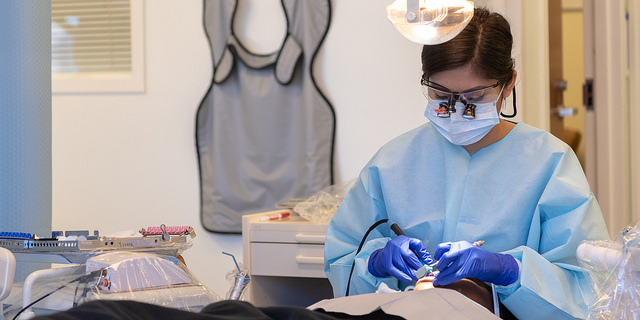Last updated on September 26, 2019
Looking for a career that pays well and doesn’t require a bachelor’s degree? Do you enjoy working with people and are detail-oriented? Well look no further: become a dental hygienist. Dental hygiene is in high demand in the Dallas-Fort Worth area. You can study dental hygiene in the heart of downtown Dallas at El Centro College, one of the seven Dallas Community Colleges.
What Does a Dental Hygienist Do?
A dental hygienist performs a variety of tasks in the dental office. If you have been to the dentist to have your teeth cleaned, chances are good that a dental hygienist did your cleaning.
Hygienists may perform the following job duties:
- Utilize assessments to determine the patient’s oral health status to include periodontal and dental charting, reviewing the medical history, and oral cancer screening.
- Expose, process and review dental radiographs (x-rays).
- Remove hard (tartar or calculus) and soft debris from the teeth.
- Apply preventive agents such as dental sealants and fluoride.
- Provide individualized oral health instruction.
- Discuss nutritional health and tobacco cessation.
- Fabricate whitening trays and athletic mouthguards.
Where Do Dental Hygienists Work?
Dental hygienists may have flexible schedules, depending on where they work. Many hygienists can work full or part time. Most hygienists work in a private dental office under the supervision of a dentist. A dental office doesn’t sound like your ideal workplace? You can also work in public health clinics, schools, nursing homes or correctional institutions.
What Classes Will I Take for the Dental Hygiene Program?
El Centro College offers a Dental Hygiene Associate of Applied Science Degree. This two-year program can be competitive but don’t let that scare you away! The Dental Hygiene program begins each fall semester in August with a capacity of 20 students. El Centro’s program combines classroom and lab skills with clinic experience in an on-site dental clinic. Some courses include:
- Anatomy and Physiology
- Microbiology
- Chemistry
- General and Oral Pathology
- Dental Hygiene Care
Do I Have to be Licensed in the State of Texas to be a Dental Hygienist?
Yes, the state of Texas requires dental hygienists to be licensed. El Centro’s program prepares graduates to take the National Board Hygiene Examination and a regional clinical board in order to apply for licensure by the Texas State Board of Dental Examiners.
What Are Students Saying About the Dental Hygiene Program?

Paige Montague: “The dental hygiene program is very challenging, but at the same time rewarding. I am developing the skills and knowledge to help people maintain a healthy lifestyle and I have developed wonderful relationships with classmates and instructors.”
“El Centro is an excellent option for cost, geographic location, and the option of free transportation by using the DART. They also have excellent faculty and facility. All the instructors have an open-door policy. They want us to be the best we can be and push us to our full potential. Because of the instructors and Dr. Vandenbush, I know I will succeed and always have constant support.”
Is Dental Hygiene a Good Career Choice?
Yes, this is a great career option! Did you know careers in dental hygiene are estimated to grow 20 percent through the next 10 years? In fact, CareerOneStop lists dental hygiene as third in its top 45 careers with the most job opportunities through 2024.
What If Dental Hygiene Isn’t the Program for Me?
Three of the Dallas Community Colleges – Brookhaven, Mountain View and Richland – offers a noncredit program in Dental Assisting, which can provide entry-level dental assisting experience.
Sign Me Up, How Do I Become a Dental Hygienist?
To start, complete the admissions process, meet with an advisor at El Centro College and download the Dental Hygiene information packet. The application timeline is from Jan. 1-May 31 each year before the fall semester.
Heads up: all students enrolled in the Dental Hygiene program are required to complete a criminal background check and drug testing after admissions to the program.
While you’re here, you should also consider checking out our previous programs of the month.
